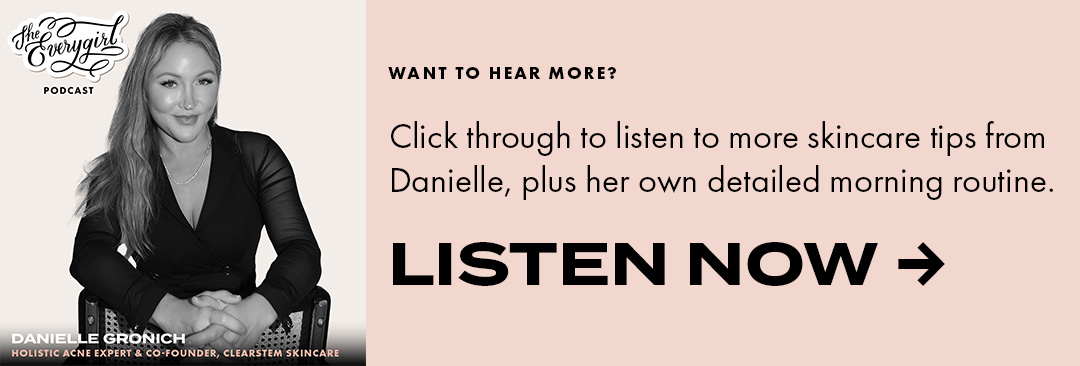Welcome to The Everygirl Podcast. Whether you’re looking for insider secrets from successful women that have your dream job, are interested in expert advice to transform your health and feel your best, or just want to be entertained and laugh along with us on your commute, we’ve got you covered.
For far too long, conversations about combating acne have focused purely on the teenage years, hormones, and using birth control as a quick fix. In reality, many people struggle with acne in their adult years, and there are so many more potential reasons for facing skin challenges beyond adolescence. Luckily, there are acne gurus out there like Danielle Gronich, co-founder of CLEARSTEM Skincare and this week’s guest on The Everygirl Podcast. Danielle spent years struggling with adult acne, and now dedicates her life to helping others get to the bottom of their own skin challenges with CLEARSTEM and at the San Diego Acne Clinic.
turns out, you don't have to spend all of your free time cleaning
From your vitamins to your shampoo, there are a whole host of potential culprits for clogged pores and pimples, many of which may surprise you. Read on for three surprising reasons you have acne that you haven’t thought of, and check out this week’s episode of The Everygirl Podcast to hear even more helpful skin tips from Danielle.
1. Genetics
According to Danielle, acne is mostly hereditary, meaning that having acne at any stage in our lives is actually something that could be passed down to us from one or both of our parents. She says that the root cause of acne is something called retention hyper-keratosis, meaning that people who are more prone to acne produce more keratin protein than others. But just because you’re acne-prone genetically does not mean you’re cursed to deal with acne forever. It just means you may have to be more careful of the products you put on your skin, foods you eat, or supplements you take in order to be acne-free. This can also be a helpful reminder that it’s OK if the journey to clearer skin takes longer than you might anticipate.
2. Pore-clogging ingredients in products
It’s happened to all of us at least once in our lives: you pick up a new product that you’re really excited about, you try it out a few times, and suddenly you have a mysterious breakout. However, according to Danielle, acne-causing ingredients in skin and hair products are actually way more common than a one-off incident like this. “There are pore-clogging ingredients in most products,” Danielle said on The Everygirl Podcast. “And by most, I mean most. I mean 95% of products have some sort of pore-clogging filler agent.” Most people are using at least a face wash, as well as shampoo, conditioner, and hair product on a regular basis, meaning that these ingredients could be impacting your skin unexpectedly.
When Danielle treats patients at her clinic in San Diego, the first thing she has them do is bring in every single beauty product that they use on a regular basis, so that she can help them run through the ingredients for potential pore-cloggers. Luckily, you don’t need to fly all the way to San Diego to find out if your moisturizer might be causing your acne; instead, you can DIY this process by copying and pasting the ingredients list of your products into the search function on the CLEARSTEM website.
3. Testosterone-spiking vitamins and supplements
We tend to think of taking vitamins and supplements as a universally healthy thing to do, but did you know that it is possible that your daily vitamin D might be causing you to break out? As Danielle pointed out on The Everygirl Podcast, “There are a lot of really common vitamins that people take, where if it’s in a really high dosage, like higher than 100-200% RDB, they can spike testosterone. And testosterone is the hormone that, when it surges, causes hormonal acne.”
Acne is both internal and external, so taking a good long look at the ingredients and saturation of your vitamins and supplements just might be the solution to your clogged pores. As Danielle mentioned, you may not inherently have a hormonal imbalance that is causing your acne, but your consumption of caffeine, B-12, and zinc supplements can cause your testosterone to spike. Plus, kicking the Celsius habit was probably already on your to-do list anyways.



 "
"
